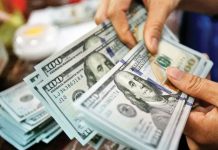An official data showed has shown on Thursday that the UK economy has entered recession since the report of two successive quarters of negative economic growth in the second half of last year.
According to a statement from the Office for National Statistics, after contracting 0.1 per cent in the previous three months, the gross domestic product shrank by 0.3 per cent in the fourth quarter of 2023. The situation no doubt was regarded as the technical definition of a recession.
An official data showed on Thursday that Britain slid into recession last year on elevated inflation and a cost-of-living crisis. This has become a blow dealing a blow to Prime Minister Rishi Sunak before this year’s general election.
Gross domestic product shrank 0.3 per cent in the fourth quarter of 2023 after contracting 0.1 per cent in the prior three months, the Office for National Statistics (ONS) said in a statement.
The statistics automatically places the economy in recession, which is defined as two successive quarters of falling GDP.
The ONS noted that all main sectors shrank in the fourth quarter – with manufacturing, construction and wholesale being the biggest drags on growth – but added the economy was broadly flat overall in 2023.
Sunak has pledged to grow the economy as one of his top five priorities as his governing Conservatives are trailing Keir Starmer’s main opposition Labour Party ahead of the election due this year.
Interestingly, the Conservatives are fearful of losing one-time strongholds in Wellingborough, central England, and Kingswood in the southwest, due to news of the recession, as voters go to the polls in two by-elections on Thursday.
With a close look at the situation, the Capital Economics analyst Ruth Gregory said,
“The news that the UK slipped into technical recession in 2023, will be a blow for the prime minister on a day when he faces the prospect of losing two by-elections,”
“But this recession is as mild as they come and timely indicators suggest it is already nearing an end.”
Finance minister Jeremy Hunt noted that stubborn inflation and high interest rates were behind the output fall – but insisted the economy was “turning a corner”.
“While interest rates are high – so the Bank of England can bring inflation down – low growth is not a surprise.
“But there are signs the British economy is turning a corner; forecasters agree that growth will strengthen over the next few years, wages are rising faster than prices, mortgage rates are down and unemployment remains low.
“Although times are still tough for many families, we must stick to the plan – cutting taxes on work and business to build a stronger economy.”
Confirmation of the recession comes one day after separate official data showed that UK inflation held at 4.0 per cent in January from December, or double the Bank of England’s target rate.
The January reading was better than market expectations of an increase to 4.2 per cent, but inflation nevertheless remains elevated, extending a cost-of-living crisis for millions of people in Britain.
Hunt added that bringing down elevated inflation remained the government’s “top” goal.
“High inflation is the single biggest barrier to growth which is why halving it has been our top priority,” he said.
According to BBC, the UK is considered in recession if GDP falls for two successive three-month periods – or quarters.

























